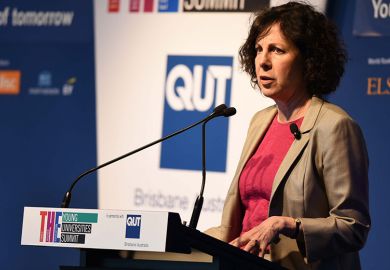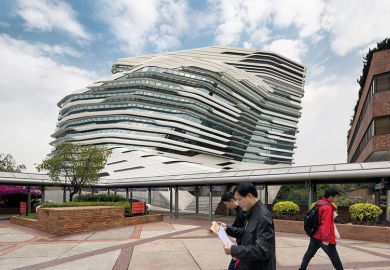How can universities attract more women and ethnic minorities to join their staff and student bodies? The answer, according to the president of an elite science college described as the US’ “poster child for gender and racial diversity”, is to listen.
With women holding 40 per cent of academic posts and six of seven departmental chairs, Harvey Mudd College, in Claremont, near Los Angeles, has attracted plaudits from the tech industry for the diversity of its faculty and its student body, of whom 46 per cent are female.
Explaining how the specialist science, maths and engineering college managed to double its proportion of female undergraduates over the past decade, its president Maria Klawe told Times Higher Education’s Young Universities Summit that training senior staff in “non-interruption listening protocols” has helped establish a culture of inclusion, which she believes has been crucial to Harvey Mudd’s success since she took over in 2006.
Speaking to THE at Queensland University of Technology in Brisbane, Professor Klawe said those leading strategy development sessions are required to learn techniques created at California’s Anita Borg Institute, which promotes women in technology.
“To start, we go around the circle of people and give each person a certain amount of time to speak without interruption,” explained Professor Klawe, who also used the techniques while she was dean of engineering at Princeton University. “People who are listening have to engage actively – there is no note-taking, shaking of heads.”
Those in charge of strategic leadership also have to act either as a scribe or as a moderator, with notes taken immediately projected on to an overhead screen to show ideas are being taken on board, Professor Klawe added.
“Everyone then gets 60 seconds to offer their first thoughts on an idea,” she said.
In addition, Professor Klawe has also introduced what she called the “least frequent speaker first” rule, which forces less forthcoming individuals to contribute to debates, she added.
“We would have Nobel laureates, students and everyone else in between in the same room and everyone gets heard,” said Professor Klawe.
Other initiatives that have helped to improve campus diversity include the redesign of all admissions materials to feature more female and minority students, Professor Klawe told delegates at the summit.
Professor Klawe said she also sends a handwritten note to all first-year female computer science students, as “women are more likely to be influenced by a personal approach”.
Since 2006, the number of female computer science majors at Harvey Mudd has increased from 10 per cent to 54 per cent, while physics and engineering majors are also roughly gender balanced.
In addition, Harvey Mudd – where annual tuition and board costs around $75,000 (£60,000) before financial support is factored in, and whose graduates earn median starting salaries of $100,000 – has increased the proportion of black students from 2 per cent in 2006 to 10 per cent in 2016. Hispanic representation has risen from 5 per cent to 22 per cent in the same period.
“Recruiting more women has been relatively easy – it’s not particularly expensive or difficult, but it requires consistency and long-term commitment,” Professor Klawe said.
However, recruiting ethnic minority students with the right grades is much more difficult, she said.
For instance, Massachusetts Institute of Technology research estimated that annually there are only 250 black students in the US who meet Harvey Mudd’s entry requirements; of these, 20 were admitted to the California college last year.
Professor Klawe admitted that the drive to diversify the college’s student body has not been universally popular, with a minority of staff complaining about the extra effort needed to support students from deprived backgrounds, who are often from ethnic minorities, she said.
jack.grove@timeshigheducation.com
On video: Maria Klawe, president of Harvey Mudd College, speaks to THE at the Young Universities Summit 2017
Register to continue
Why register?
- Registration is free and only takes a moment
- Once registered, you can read 3 articles a month
- Sign up for our newsletter
Subscribe
Or subscribe for unlimited access to:
- Unlimited access to news, views, insights & reviews
- Digital editions
- Digital access to THE’s university and college rankings analysis
Already registered or a current subscriber?










